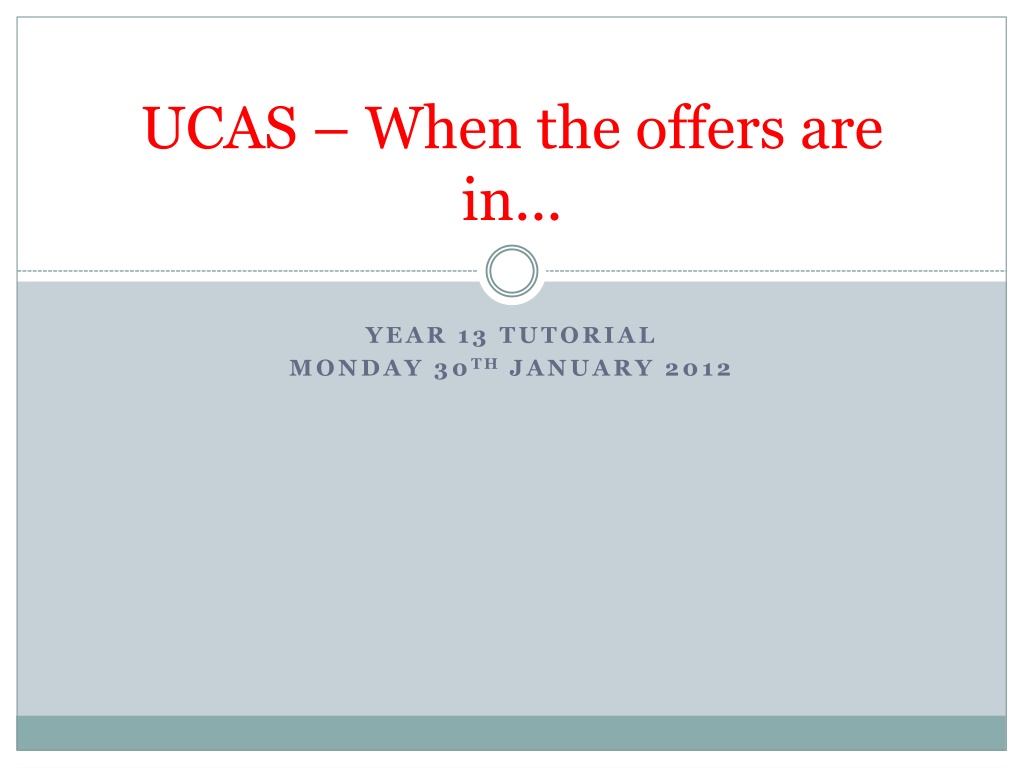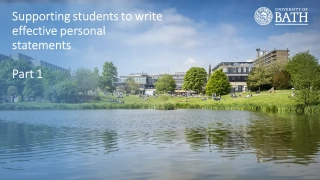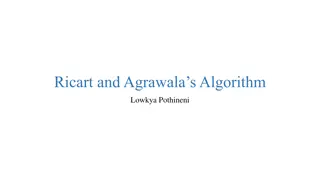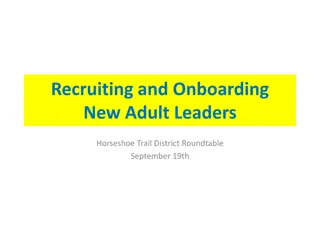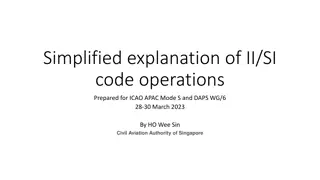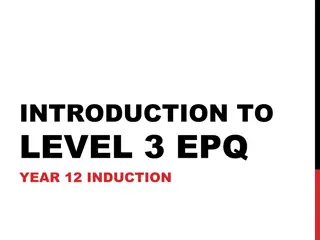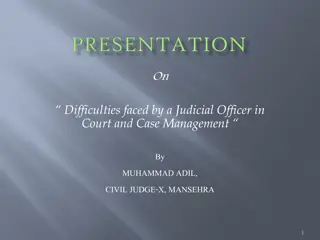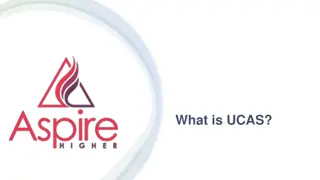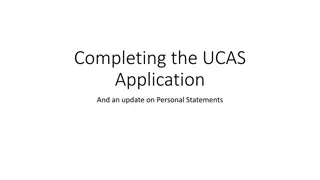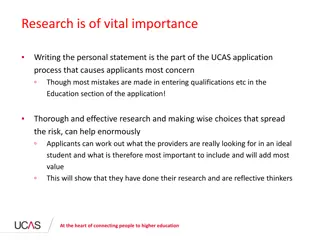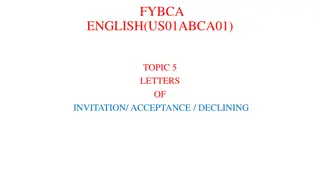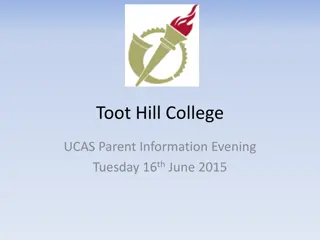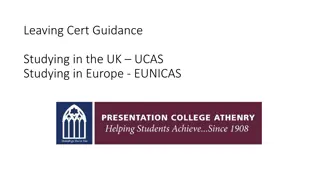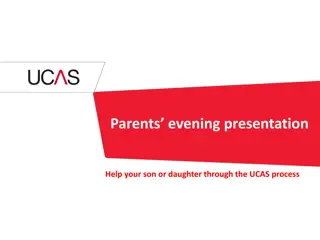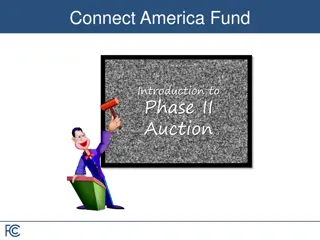Understanding UCAS Offers and Replies Process for Year 13 Students
Learn about the UCAS application process for Year 13 students, including when to expect offers, how to reply, and important considerations when making choices. Discover the options of firm acceptance, insurance acceptance, and declining offers, ensuring you make informed decisions for your future education.
Download Presentation

Please find below an Image/Link to download the presentation.
The content on the website is provided AS IS for your information and personal use only. It may not be sold, licensed, or shared on other websites without obtaining consent from the author. Download presentation by click this link. If you encounter any issues during the download, it is possible that the publisher has removed the file from their server.
E N D
Presentation Transcript
UCAS When the offers are in... YEAR 13 TUTORIAL MONDAY 30THJANUARY 2012
What happens next... If UCAS received your application form by 15th January 2012 you can expect to have all of your offers/decisions by May 2012. However, many students will hear from all of their universities well before this date. You will then be required to make your Firm and Insurance Choices. If UCAS have received decisions from all of your choices and you have at least one offer, UCAS will email you to let you know there has been a change to your application, and ask you to look at Track. If you haven't provided a valid email address UCAS will send you a letter which will ask you to reply to your offers.
Points to remember when replying to your offers... Try to attend open days or visits before you decide, but remember to reply by the deadline. If you are visiting a university or college after your reply date, please contact the university or college for advice. Think carefully before you decide which offers to accept because once you accept an offer, including an insurance offer, you are committed to that course (or courses). You can reply to offers without waiting to hear back from all your choices. You can cancel all outstanding decisions and reply to the offers that you have received using Track. But you must be certain about which offers you wish to accept, as once you have made your replies you will not be able to reverse any withdrawals. If you are replying to a joint conditional offer, e.g. for a degree and HND, you are replying to the whole joint offer - when your exam results are published, the university or college will decide which part of the offer is most suitable for you
Replying to your offers - You reply to each offer in one of the following ways: Firm Acceptance Insurance Acceptance Decline Firm acceptance - Your firm acceptance is your first choice - this is your preferred choice out of all the offers you have received. You can only have one firm acceptance. If you accept an unconditional offer, you are agreeing that you will attend the course at that university or college, so you must decline any other offers. We'll send you a letter which will explain whether there is anything else you need to do. If you accept a conditional offer, you are agreeing that you will attend the course at that university or college if you meet the conditions of the offer. You can accept another offer as an insurance choice. Insurance acceptance - If your firm choice is a conditional offer, you can accept another offer as an insurance choice. Your insurance choice can be conditional or unconditional and acts as a back-up, so if you don't meet the conditions for your firm choice but meet the conditions for your insurance, you will be committed to the insurance choice. You can only have one insurance choice. The conditions for your insurance choice can be higher than your firm choice, but be aware that if you're not accepted by your firm choice, it's unlikely that you will be accepted for an insurance choice that requests higher grades. You don't have to accept an insurance choice - if you're not sure about any of your other choices once you have accepted a firm choice, you're not obliged to accept one as an insurance option. Decline - Once you have decided which offer to accept firmly, and which (if any) to accept as an insurance, you must decline all other offers. If you don't want to accept any of the offers, you can decline them all. You will then be eligible to use Extra or Clearing, depending upon your circumstances
There are four combinations of offers and replies Unconditional firm only - you've firmly accepted an unconditional offer. You cannot have an insurance choice. Conditional firm only - you've firmly accepted a conditional offer. Conditional firm + conditional insurance - you've firmly accepted one conditional offer and accepted another conditional offer as an insurance. Conditional firm + unconditional insurance - you've firmly accepted a conditional offer and accepted an unconditional offer as an insurance.
Information on Track Reply dates are based on when we receive the last decision from your choices: How and when to reply to your offers... Use Track to reply to your offers. Your reply date will be displayed in Track. Your reply date is based on when we receive the last decision from your choices, so it might be different to other people's. If you don't reply by the date given, your offers will be declined. If this happens, call our Customer Service Unit to find out what you can do. 2012 entry cycle Last decision by Your reply date is 31 March 2012 9 May 2012 10 May 2012 7 June 2012 8 June 2012 28 June 2012 19 July 2012 26 July 2012
Activate !!! In pairs or small groups, have a look at the scenarios below. Discuss what course of action each student should take given the information about Firm/Insurance/ UCAS Extra and Clearing. Scenario One Bob Bob has received 3 conditional offers. His predicted grades are BBB. His offers are: Northumbria conditional on attaining BBB or 300 UCAS points from 3 A2 s Manchester Metropolitan University - conditional on attaining BBC Leeds Met conditional on attaining CCC or 240 UCAS points from 3 A2 s. What should Bob do? ___________________________________________________________ ___________________________________________________________ ___________________________________________________________ ___________________________________________________________ ___________________________________________________________ ___________________________________________________________
Scenario Two Sam Sam has received two conditional offers. His predicted grades are BBC. However Sam is unsure about whether or not he actually wants to study the courses he has applied for. He would like to go to university this year. What are his options? ___________________________________________ ____________________________________________ ____________________________________________ __________________________________________ ____________________________________________ ____________________________________________
Scenario Three Mel Mel has received five conditional offers. Her predicted grades are AAA. Her offers are: Durham conditional on attaining A*AA Edinburgh conditional on attaining AAA Warwick conditional on attaining AAA Manchester conditional on attaining AAB Glasgow conditional on attaining AAB What should Mel do? ____________________________________________________ _____________________________________________________ ___________________________________________________ _____________________________________________________ ___________________________________________________ _______________________________
Scenario Four Sue Sue applied for two courses and has not been offered a place on either. What are her options? _______________________________________ ________________________________________ ________________________________________ ________________________________________ ________________________________________ ________________________________________
